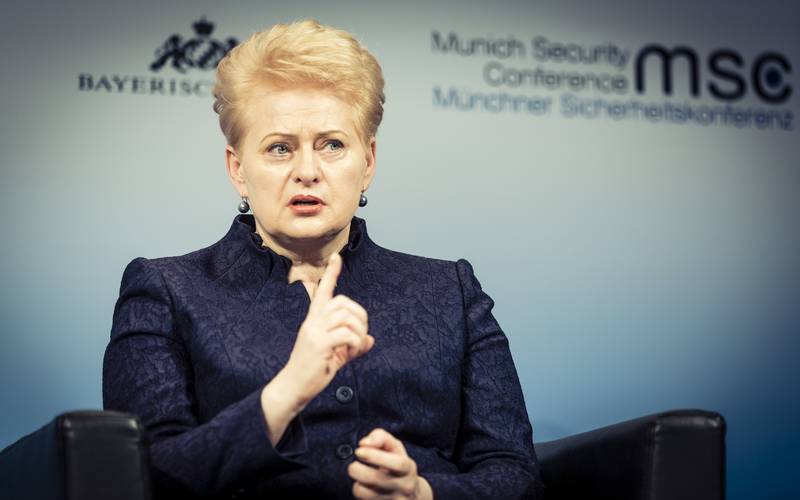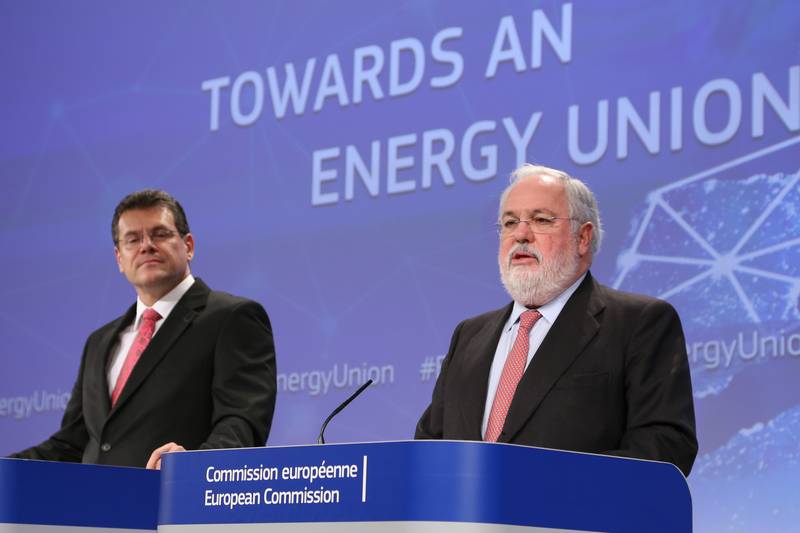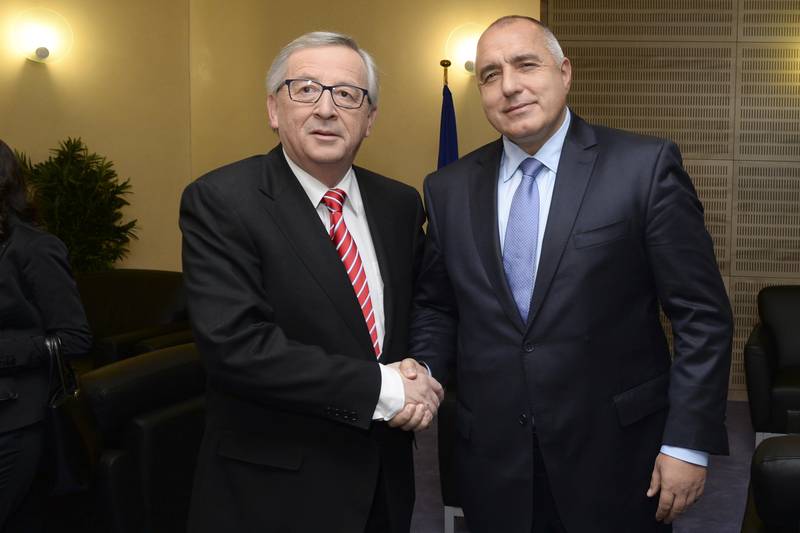Energy Dependence Dooms EU to Instability
Adelina Marini, July 21, 2014
 The European Commission President-elect Jean-Claude Juncker is a firm proponent of the concept of an energy union, proposed by Poland's Prime Minister Donald Tusk who was one of the strongest candidates to head the European Council but, as The Financial Times revealed last week, his nomination was rejected by ... what a surprise ... David Cameron. The British prime minister's argumentation was, of course, with the same short horizon as his previous vetoes - the 2015 parliamentary elections and the bitter fight with UKIP over voters' hearts and minds. According to the newspaper, Mr Cameron is worried that Poland is not friendly toward London's attempts to restrict the freedom of movement of workers. In the same time, Britain is among the EU member states that have scored significant increase of their dependence on energy import.
The European Commission President-elect Jean-Claude Juncker is a firm proponent of the concept of an energy union, proposed by Poland's Prime Minister Donald Tusk who was one of the strongest candidates to head the European Council but, as The Financial Times revealed last week, his nomination was rejected by ... what a surprise ... David Cameron. The British prime minister's argumentation was, of course, with the same short horizon as his previous vetoes - the 2015 parliamentary elections and the bitter fight with UKIP over voters' hearts and minds. According to the newspaper, Mr Cameron is worried that Poland is not friendly toward London's attempts to restrict the freedom of movement of workers. In the same time, Britain is among the EU member states that have scored significant increase of their dependence on energy import.
Currently, the EU is in a stalemate in terms of Russia because, due to its energy dependence as a community and individual member states, the Union cannot do much more than just preach the Kremlin that what it is doing in Ukraine and in the most energy dependent member states is bad. Unlike the US, which is expected by 2020 to become one of the biggest natural gas exporters (shale gas) in the world, thus being capable to afford imposing serious economic sanctions on Putin's regime and the strongest weapon in his foreign policy - export of oil and gas.
And while the crisis which is right next at EU's eastern border is becoming more serious by the day, the EU is incapable of agreeing who should be its high representative for the foreign policy and who should take over the presidency of the European Council. And how does the issue of energy dependence stand? The economic directorate of the European Commission has recently published a detailed analysis of the dependence of the member states individually and the EU at large (on average) on basic resources - gas, oil, nuclear energy. For the purpose of assessment, the Commission has used three main indicators: security of energy deliveries, energy and carbon intensity, energy products' ягьие in trade. The results are scary.
EU's energy dependence floats between 52% and 53%
This, however, is an average result that does not tell the whole story which is that a majority of member states have gradually reduced their energy dependence in the period 2008-2012. This is to some extent due to the drop of consumption in the beginning of the crisis and to the fast development of renewable resources. In terms of oil products, the dependence on import is very high in the EU and in 2012 it was assessed to be 86%. Most member states are completely dependent on import. An exception are Estonia and Finland whose dependence has dropped by 18% and 10% accordingly. In Lithuania, import has increased remarkably by 26 per cent while UK has turned from a net exporter into  an importer of 36% of its consumption. Denmark is the only oil exporter in the EU, but there is a decline there too - in 2012 its export declined to 35% from 49% in 2008.
an importer of 36% of its consumption. Denmark is the only oil exporter in the EU, but there is a decline there too - in 2012 its export declined to 35% from 49% in 2008.
The situation with natural gas is much more different and varies from country to country. The import dependence is in constant rise since the beginning of the century when it was less than 50% and in 2012 it was already 66%. EU's gas dependence is very high in 14 countries where the level of dependence is above 90%. Several member states have reduced their gas dependence as most remarkable that is in Romania and Hungary, but also in Bulgaria and the Czech Republic although not as remarkably. The European Commission document shows that dependence has increased significantly in UK and Croatia where the domestic production of gas is rapidly declining and that forces the two countries to rely more and more on import of natural gas to cover their needs.
An increase of dependence is noticed in the import of solid fuels as well. That increase is significant - 25% in the period 2001-2012. The increase is significant in Germany and Spain. In 9 member states the dependence on import of solid fuels is above 90%. A noticeable decline of this type of dependence is registered in Bulgaria, Greece, Romania and Slovenia. A special case is Estonia which from a net exporter in 2009-2011 has turned into a net importer in 2012, although with an insignificant share. The Czech Republic and Poland are the only remaining exporters of solid fuels but their exports have declined dramatically since 2001.
The situation with nuclear energy varies, too. 14 member states do not use nuclear energy. Its share is in a constant decline in the other member states in the period 2001-2008 but growth has returned in some member countries like the UK, the Czech Republic, Hungary, Romania and Spain. In the same time, Lithuania has entirely abolished nuclear energy in 2009 and Germany has reduced its share from 12.5% to 8%. Growth is significant of renewables as well as most remarkable it is in Spain, Italy, Bulgaria and Greece who have doubled their share between 2008-2012. Malta has the lowest share of renewables in the EU - just 1%.
Bulgaria is among the economies with highest and increasing energy intensity together with Estonia, Greece and Latvia. It has much to do with the energy dependence because it makes the member states dependent on fuel prices and has a direct impact on the gross domestic product. The more energy intensive industry and transport are the more vulnerable the country is to loss of competitiveness. The same applies to carbon intensity because the higher it is the stricter the policies to mitigate climate change should be.
In the past decade, all member states have marked an increase of the weight of energy in the consumers' basket with the exception of Denmark, Sweden and Romania. In some countries like Ireland, Italy, Luxembourg, Malta, Greece and UK the share of energy has doubled. In the Czech Republic, Slovakia and Bulgaria the increase is the smallest, but there is. The biggest weight energy has in the consumers' basket of Hungary, Latvia, Lithuania, Croatia and Slovakia. The countries with the biggest diversification of import sources of energy are Croatia, Greece, Portugal, Italy and Slovenia. The level of  diversification has deteriorated the most in the Czech Republic, Hungary, Belgium, France and The Netherlands.
diversification has deteriorated the most in the Czech Republic, Hungary, Belgium, France and The Netherlands.
An energy union or a risk of energy crisis
Against the backdrop of the complicated situation with EU's dependence on mainly Russia, the European Commission has recently presented an energy security strategy in which it points out that quite too often energy security issues are resolved on national level without taking into account the member states' independence. The Commission believes that the continent's energy security can be significantly improved if a collective approach is adopted through a functioning internal market and bigger cooperation at regional and European level. The Commission goes much farther by pointing that the increasing of energy coordination should be embedded in the process of enlargement too - the candidate and aspiring countries should begin to apply the same principles as the member states. If this strategy is adopted this will mean serious problems for Serbia which in the past months is trying to secure a difficult balance between Brussels's pressure to impose sanctions on Russia which, for its part, possesses a large part of Serbia's energy infrastructure.
The candidate and aspiring countries' dependence, especially in the Western Balkans, is very well realised both by Russia and US which is why it is very important that the European Commission realises this as well. Moreover, Russia has clearly stated that it has no intention to leave the Western Balkans alone. This happened during the traditional Croatia Forum in Dubrovnik this year when Moscow marked the Western Balkans, too, as a territory it will fight for. In a special address to the forum Russia's deputy foreign minister Alexey Meshkov recalled that the Balkans play an important role in the Russian foreign policy "due to common history, long-standing friendship, common Slavic roots, cultural and religious kinship and Russia's involvement in the process that take place in this region".
To Russia the Balkans are simply another area of influence. Meshkov severely criticised EU for the methods it applied to "keep the Western Balkans in the European orbit". Resources in the region are to a large extent depleted and this raises the question what will Brussels prescribe to help deal with the social and economic problems in the region. We do not want the EU to use the Western Balkans as its own area of influence and to force them to restrict their interactions with the rest of the world, the Russian deputy minister said. He made it clear that Russia will not tolerate a change of the economic interests in the region and put forward a concrete demand - the countries negotiating for accession to hold consultation with Moscow as well regarding the protection of the Russian interests in the region.
A day before Alexey Meshkov, in Dubrovnik, a message to the EU conveyed Victoria Nuland, US Assistant Secretary of State. She said that now more than ever it should be worked for Europe's energy  security by securing diversification of deliveries, building capacity to reverse flows, building import terminals and interconnectors. In this regard, the US sees Croatia as an important energy security hub.
security by securing diversification of deliveries, building capacity to reverse flows, building import terminals and interconnectors. In this regard, the US sees Croatia as an important energy security hub.
In the European Commission energy security strategy Russia is described as a threat number one. Progress in realisation of this threat is quite weak and late. So far the realisation is at Commission level but there is good news and it is that the new president Jean-Claude Juncker is a supporter of energy integration. It only remains the member states to deal with this issue seriously and as fast as possible. The current president of the European Council, Herman Van Rompuy, played an important role, although not very successfully. He proposed the holding of regular energy summits right after the big gas crisis of 2009. Since then, though, the leaders have gathered on this issue only twice without much of a result. But depending on who will be elected European Council president and chief of the European diplomacy will make it clear if the member states, too, realise the seriousness of their situation or would they, again, try to delay the solution to a problem that is persistently undermining the Union's security.
If in 2009 the illusion that Russia is a reliable partner could be justified now it is more than clear that President Vladimir Putin has long passed the point of no return. It is a real illusion to believe that while he is in power relations with Moscow can be "normalised". The EU has gone a long way to deepen its integration because of the debt crisis in the euro area and the economy is gradually returning to normal. This recovery, however, requires more energy. Besides, there is a risk of a slow down or a reversal of the recovery process if energy security is not ensured. This will mean that the "unacceptable" unemployment in EU will not begin to drastically decline which will continue to fuel euroscepticism and nationalism and it generally means instability. Too high a price for securing the too narrow national or domestic political interests.
 Dalia Grybauskaite | © MSC/Koerner
Dalia Grybauskaite | © MSC/Koerner Maros Sefcovic, Miguel Arias Canete | © European Commission
Maros Sefcovic, Miguel Arias Canete | © European Commission Jean-Claude Juncker, Boyko Borissov | © European Commission
Jean-Claude Juncker, Boyko Borissov | © European Commission